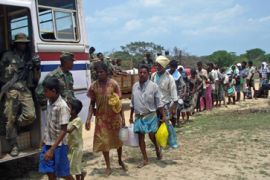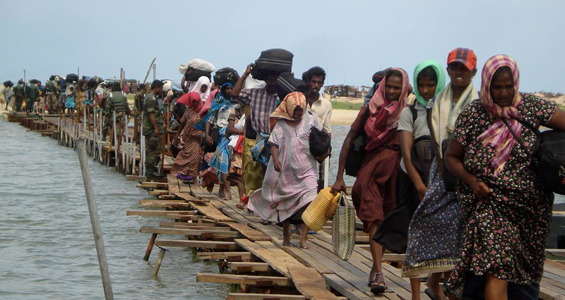Analysis: Endgame in Sri Lanka
Analysts talk about the current and future course of the Sri Lankan conflict.

 |
| Tens of thousands of civilians have been forced to migrate from the northeastern conflict zone. Many are injured and have left behind dead relatives or friends [AFP] |
Al Jazeera has spoken to analysts about the current state of the Sri Lankan conflict and its future. The separatist Liberation Tigers of Tamil Eelam (LTTE) has been pushed into a tiny coastal area in the northeast by the military, with tens of thousands of civilians being forced to migrate from the conflict zone. A military victory after 26 years of war appears imminent, but support for the Tamil movement may remain.
| Ashok Mehta, security analyst for the Institute of Defence Studies, New Delhi |
Al Jazeera: Is the military war over?
It was over a long time ago. The war was over when the LTTE administrative headquarters of Killinochchi fell almost four months ago. And the advance and the military operations so far have carried on relentlessly in the face of accompanying civilians, or rather the LTTE has been taking civilians along with them.
As a conventional force [the LTTE] is completely finished. It has a residual guerrilla warfare capacity.
Would such a residual guerrilla force be able to threaten the government?
There are two factors. One is the alienation factor of the civilian support. Because the LTTE has allegedly used the civilian Tamils as human shields. That would have annoyed them and alienated them. So this crucial factor of local support would be lost. But we are not sure of what will actually happen on the ground.
Number two: This fighting that you still see [by the LTTE], one of its purposes is to buy time to relocate cadres and weapons, and to hope that the international agencies such as the UN and India in particular can force some kind of ceasefire and they can get a more honourable exit from this war and that’s why you see this last-ditch stand.
There will likely still be political support for the Tamils, so will the government be able to assume a peacetime state of mind after any military victory?
No it most certainly will not. Because the political grievances that have lingered for the last 30 years are not going to go away any time soon.
In the euphoria of the military victory, I think the government has lost sight of the political solution. Until that political solution is hastened, the capacity and the room for the LTTE or any other political Tamil groupings to ignite the disaffection into a broader guerrilla warfare is there.
And the LTTE cadres are already present, some of them further in the east and in the north. So the basic fodder is available, all that is needed is ignition.
Is there evidence to back up the government’s assertions that they have been working on a political solution?
No, I don’t think so.
Because we have heard for many years that a political solution is on the way. In fact, there is the 13th amendment [to the constitution], which was promulgated once the Indo-Sri Lanka accord was put in place in 1987-8, that enables devolution.
But successive governments in Sri Lanka have failed to promulgate and implement devolution and there is very little hope now with the military victory tucked away that they will be in any hurry to implement the 13th amendment or anything that is watered down.
So I suspect that in this hour of military glory a political solution is far more distant than it was some time earlier.
| Narayan Swamy, Indian commentator and author on the Tamil Tigers |
Al Jazeera: Is Velupillai Prabhakaran, the Tamil Tigers leader, likely to back down at this stage?
I don’t think he will back down, if his personality is any guide.
He will keep fighting, even if it is just a strip of land he has with him. He will not like to compromise, he will not like to show the white flag. That will go against all he has done for the past 26 years.
Remember, he has made people fight on. People have fought for the cause and they have died. There is no way now he can back off.
But will the Tamil people have any leverage once they are defeated?
The Tamil people are in a far worse position than they were in 1983 when it all began.
They are a very proud community and they have lived a very dignified life even if they have had many problems with the government.
Once this military activity is over will there be enough support in the Tamil community or among those LTTE fighters who managed to escape to continue their struggle?
If you are referring to a military struggle, I think that there will not be many takers any more. I think ordinary people are just fed up, absolutely fed up of all this gore, this bloodshedding violence, unending killings, assassinations, everything. And we are not just talking of the Tamil Tigers.
But there does seem to be an enormous diaspora of Tamils around the world who seem willing to fund and support the LTTE. Do you think that network will continue?
That network exists and they will, of course, continue to have sympathy for the Tigers and will probably continue to support them.
But they are far removed from the realities of the northeast of Sri Lanka.
| Charu Lata Hogg, associate fellow at the Chatham House in London |
Al Jazeera: Why hasn’t the conflict attracted the same sort of attention that other conflicts do?
This is largely because Sri Lanka is not very important geopolitically. The international community perceives the ultimate demise of the Tamil Tigers as perhaps a good thing and as the end of terrorism in Sri Lanka. Also, potentially, there is a realisation that if LTTE terrorism in Sri Lanka ends, it perhaps contributes to the global fight on terrorism.
But predominantly the Sri Lankan government has been very savvy in the way it has warded off international pressure and scrutiny. Its reliance on China for its arms and on Pakistan has reduced its reliance on the Western world.
In countries with large ethnic Tamil populations or Tamil exiles, can we expect more tensions as a result of any sort of defeat in Sri Lanka?
The defeat of the LTTE as a conventional force is not the end of terrorism in Sri Lanka and it definitely does not imply a resolution of general politcal grievances that the minority Tamil community has.
So what will result is an aggrieved minority within the country and an embittered diaspora. So they will definitely whip up a great deal of hysteria around this unless there is a negotiated settlement.